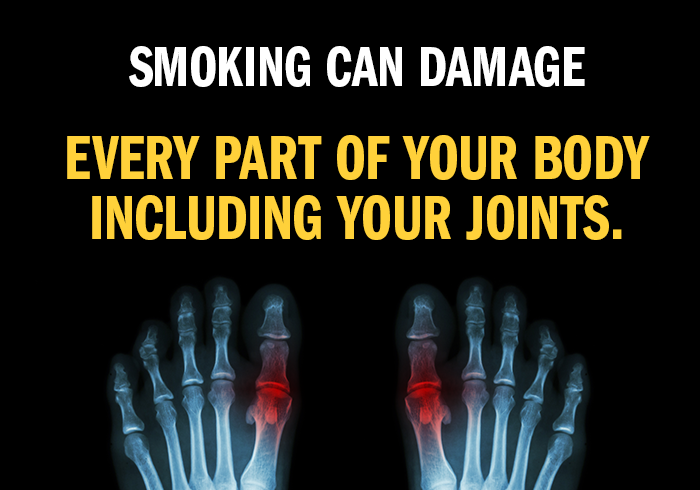Yes… and there is so much evidence!
Research studies show a strong link between smoking and autoimmune diseases such as rheumatoid arthritis and lupus. Autoimmune diseases are a group of disorders caused by the immune system’s lack of self-control. The immune system is designed to attack foreign invaders to the body such as bacteria, viruses, fungi and parasites. In autoimmune disease, the immune system mistakes normal parts of the body as foreign and goes on the attack leading to hyperactivity and thus inflammation.
Rheumatoid arthritis is the classic example of an autoimmune disease. It is a chronic condition that predominantly affects your joints by causing pain, swelling and reduction in function with ultimate progression to irreversible damage. Although small joints in hands and feet are most commonly involved, rheumatoid arthritis can also affect larger joints as well other organs such as eyes, lungs, skin or kidneys.
Autoimmune diseases have a genetic component, making it more prevalent in certain families. These genetic predispositions lead to disease when a trigger is present. There are various proposed triggers including chemical exposure, stress and infections. Among these, chemical exposure related to tobacco use has been strongly linked to onset of multiple inflammatory autoimmune conditions including rheumatoid arthritis.
There are numerous studies in medical journals documenting the direct relationship between smoking and rheumatoid arthritis. Latest studies show that smoking reduces the effectiveness of many rheumatoid arthritis medications with active smokers less likely to reach remission as compared to non-smokers. There is also evidence that when monitored for 5 years, rheumatoid arthritis patients who smoked had double the death rates as those who did not smoke. On the positive side, risk of death reduced significantly in the first year after quitting and continued to reduce over the years.
Risk of developing rheumatoid arthritis is highest in those who have smoked 20 years or longer, although studies have also shown increased risk with even light smoking. The risk of developing rheumatoid arthritis remains high for about 20 years after quitting smoking, however, the overall risk of developing rheumatoid arthritis reduces over time.
In clinical practice, the aggressive nature of rheumatoid arthritis in smokers is observed on a regular basis and well known to rheumatologists, who are the experts in treatment of rheumatoid arthritis and other autoimmune diseases. That patients who continue to smoke most often have more aggressive rheumatoid arthritis with more difficulty in controlling the disease activity. In addition to poor response to medications, those who continue to smoke are observed to have reduced exercise tolerance contributing further to reduction in daily function.
If you are a current smoker and have a family history of rheumatoid arthritis, it is strongly recommended that you consider quitting smoking as soon as possible. Although even without family history, there is a significant increased risk of rheumatoid arthritis in those who smoke, those with family history of the disease are at overall higher risk.
Rheumatoid arthritis and other autoimmune diseases such as lupus and psoriatic arthritis are only one group of diseases caused by tobacco. Others include pulmonary conditions such as chronic obstructive pulmonary disease, heart disease, stroke and multiple forms of cancer. So, if there is a time to quit, it is now!
There are multiple aides available in the market to assist those in quitting smoking including medicated patches, oral medications as well as alternative approaches such as acupuncture, hypnotherapy (hypnosis) and cognitive behavioral therapy. It is best to discuss these options with your doctor to choose the best option to fit your lifestyle. Most importantly, the goal must always be to stop completely.
 Dr. Sheeja Francis is a board certified Rheumatologist at Premier Medical Group. She specializes in state-of-the-art management of rheumatoid arthritis, lupus, sjogren’s syndrome, scleroderma, gout, pseudogout, vasculitis, osteoarthritis and osteoporosis among many other musculoskeletal and autoimmune disorders.
Dr. Sheeja Francis is a board certified Rheumatologist at Premier Medical Group. She specializes in state-of-the-art management of rheumatoid arthritis, lupus, sjogren’s syndrome, scleroderma, gout, pseudogout, vasculitis, osteoarthritis and osteoporosis among many other musculoskeletal and autoimmune disorders.
Dr. Francis has offices in Fishkill, New Windsor and Poughkeepsie # (845) 614-0700

